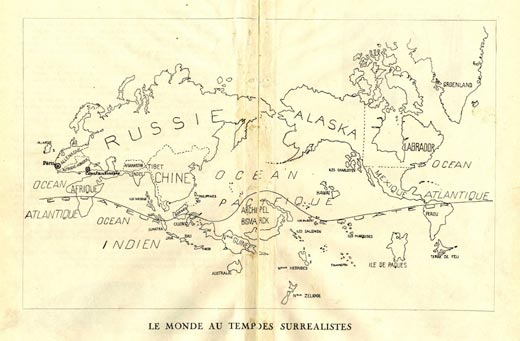
Surrealist map of the world
 “Whatever” as the ethical ground for the potentiality of a party without party.
“Whatever” as the ethical ground for the potentiality of a party without party.
“I prefer not [to]….” says Herman Melville’s Bartleby the scrivener, three times. This famous speech act constitutes the ur text “what if/ever - potentiality” of Italian philosopher Giorgio Agamben’s ethics for the contemporary philosopher (as) scrivener, the one who like the party without party member may engage in “an experience of the possible as such” (Potentialities 2000: 249). Does this privileging of potentiality in the political process coincide with the renunciation of the creative will to power in Guy Debord’s famous line from his film Critique de la separation (1960-1)? “I have scarcely begun to make you understand that I don’t intend to play the game”…at least, one should or could add, “not in the usual way.” And yet negativity is an act of will, is it not? And if “action speaks louder than words” as we understand it in the vernacular sense, then perhaps preference (I prefer not) is an illocutionary act that infers the actual (result) of the speech act as a whole. This was certainly recognized as such by the receiver of Bartleby’s ‘communication’ – the man of the law! Perhaps this is also a structure versus agency issue (debate/debat)……… n’est pas/nicht? And this is necessarily one that the contemporary philosopher, artist or politician may identify as an aporia for the continuance/maintenance/potentiality of philosophy, art and politics as modes of institutionalized discourse.
Taking his cues from Aristotle’s Metaphysics “thought thinking itself, which is a kind of mean between thinking nothing and thinking something, between potentiality and actuality” (251), Agamben affirms the anaphorized potential of Bartleby’s speech act: “I would prefer not to prefer not to….. “(255). He follows with a discussion that presents the proposition that “the aporias of contingency….. are tempered by two principles” (261), the first the “irrevocability of the past” and the second, “conditioned necessity” both of which are contingent upon one another. What if conventional party politics, partisanship left/ centre/right divisions were a thing of the past? Now to the Dead Letter Box and the potentialities of a party without party!
Agamben, Giorgio, Daniel Heller-Roazen (ed. and Translation). Potentialities: Collected Essays in Philosophy. Stanford; Stanford University Press. 2000.
Agamben, Giorgio, Vincenzo Binetti and Cesare Casarino (Translation). Means Without End: Notes on Politics. Minneapolis;University of Minnesota Press. Theory Out of Bounds, V. 20. 2000,
Party without Party, Rm 103 Auckland, August 2005
Party without Party, In the Context of Art, Warsaw, October 2006